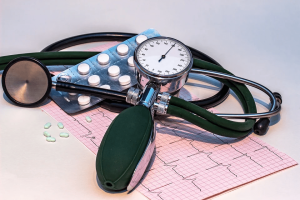
Standard high blood pressure treatments include routine exercise, medication, stress management, and proper nutrition.
While these methods are by no means outdated and are often still a part of comprehensive health management, additional medicinal treatment is often necessary to achieve optimum improvement.
Researchers and healthcare practitioners are always looking for new ways to expand our knowledge of hypertension and what we can do to prevent it. Advancements in treatment have followed, especially since the demand for these treatments has only grown over the years.
The Growing Need for High Blood Pressure Treatments
The prevalence of high blood pressure in the general population is certainly going to continue.
Not only is it the current greatest contributor to disease globally, but the number of people affected by it has only increased over recent years.
There are many possible reasons for this. One might be the overreliance on cheap, quick meals that are high in all the compounds that can raise your blood pressure. It may also be a result of the average person’s life being busier and more stressful or simply a result of genetic predispositions.
Most likely, it is a combination of many different factors.
Either way, the need for effective high blood pressure treatment and prevention is greater than ever, which has fueled many different studies and resulting discoveries.
Modern Advancements
A good diet and plenty of exercise are as reliable for reducing blood pressure as ever. However, these may not always be enough on their own.
Most modern advancements have focused on improving the effectiveness of blood pressure medications as well as reducing any harmful medication side effects. This has led to new developments in drug therapies.
Combined Medication Therapy
Some medications that work just well enough on their own may become even more effective when combined with another drug.
Such is the case for beta-blockers and vasodilators, both of which have been used to treat high blood pressure before but which weren’t commonly combined until very recently.
The main goal of beta-blockers is to limit your body’s ability to access the hormone epinephrine, or adrenaline. When you’re startled, stressed, or angry, your body produces epinephrine, which, in turn, raises your blood pressure.
While this is great if you’re a caveman facing down a dangerous animal, it’s not so good if you have constant stress from your day job, which is why epinephrine needs to be restricted.
Vasodilators, on the other hand, directly target your blood vessels. They have a dilating effect, which means blood vessels widen, and blood can pass through them more easily.
When beta-blockers and vasodilators are combined in a safe ratio, the widened blood pathways and greatly reduced epinephrine levels keep your blood pressure under better control than either drug could accomplish on its own.
The Triple Pill
One of the most recent developments in managing blood pressure comes in the form of the triple pill, which began its development in 2018. This pill combines low doses of three different types of antihypertensive medications in an attempt to improve effectiveness and reduce the frequency of harmful side effects from blood pressure pills.
The triple pill formulation includes an angiotensin II receptor antagonist, a diuretic, and a calcium channel blocker. Each plays a role in facilitating normal blood flow.
The angiotensin II receptor antagonist prevents the cells in the smooth muscles of your blood vessels from utilizing angiotensin II. Since this hormone typically restricts blood flow, restricting its uptake prevents arteries from constricting and keeps blood moving.

Diuretics increase urination frequency, which is a natural way for your body to rid itself of excess sodium and fluid that could be contributing to high blood pressure.
Finally, the calcium channel blocker assists in relaxing blood vessels and promoting normal blood flow.
When combined, these three elements have a significant ability to lower blood pressure without overtaxing the body.
New Antihypertensive Drugs
There are already quite a few different drugs used to treat hypertension, but recent developments have introduced a new selection of medications that might be more effective or cause fewer side effects for different people. These include monatepil, imidazolines, and vasopeptidase inhibitors.
Monatepil is both a calcium channel blocker and an alpha one blocker. This dual-action works to decrease contraction at the blood vessel smooth muscle, which makes it a somewhat more effective antihypertensive than prior medications. Monatepil may also have fewer related side effects and be more tolerable to different people.
Imidazolines work on special central receptors to decrease vascular tone and can assist in blood pressure regulation. These new medications are a popular area of research and look to be especially useful in cardiovascular treatment.
Vasopeptidase inhibitors prevent blood vessels from constricting via the blockade of angiotensin II. They have also been indicated to be very useful in the treatment of heart failure.
These new antihypertensive drugs have already shown great promise in combating high blood pressure and related conditions, and there will doubtless be many more developments that follow in the coming years.
Final Thoughts
Our knowledge of our bodies and how we can best take care of them is always expanding.
As new breakthroughs occur, we can expect to see improvement in managing high blood pressure while achieving as few side effects as possible.
